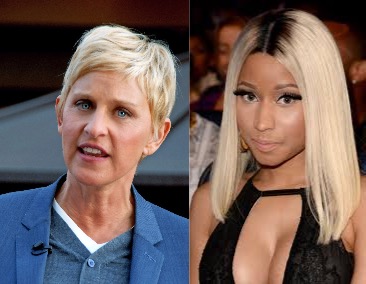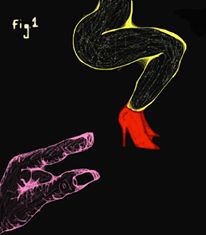
This week on the Ellen DeGeneres Show, Ellen aired an “exclusive clip” of Nicki Minaj’s upcoming ABC Family show which is based on her childhood in New York. The skit involved the actors playing Nicki and her parents wearing huge prosthetic backsides, causing them to knock over items around the house. After the clip ends, Ellen simply concludes by stating: “They have big butts. That’s the joke.”
[fbvideo link=”https://www.facebook.com/colorlines/videos/10150553599469967/” width=”500″ onlyvideo=”1″]
This sheer comedy gold has highlighted a number of problems; the over-stepping of a white ally; the glaringly obvious resemblance of the minstrel show – a form of entertainment either performed by white people in blackface or by black people. However, most problematic, is the overwhelming lack of respect for the black female body that still perpetuates today’s culture. The only way Ellen was able to pay homage to her “good friend”, Nicki, one of the most successful female rappers of all time, was to reduce her childhood to a butt joke, a joke that lacked taste or any sense of purpose.
Blue Telusma hits the nail on the head when she tries to emulate what Ellen’s thought process must have been when giving the skit the go-ahead:
Nicki and I are cool. She lets me giggle over her booty all the time. She won’t mind if I turn the story of her life into a skit that resembles a minstrel show revival. She won’t mind if I over-sexualize a young black girl and make her bend over to expose her rear to a laughing audience. Nicki won’t be upset if I reduce the entirety of the black experience to the absurdity of their grotesque physiques. Everyone knows black people have huge butts so this should be funny. Haha! Butts
Twitter erupted with many accusing Ellen of “reducing black women to nothing but an object” while others called it “problematic at best and offensive at worst”. Some might dismiss this incident as “just a butt joke” – if you fall within this category, girl bye! So far on the internet, I have read complaints about the black community leaping on the politically-correct wagon just because they can and that it’s “not that deep”. But therein lies the problem. Anyone who is not a black female can choose to dismiss issues of hyper-sexualisation around the black female form and simply move on, whereas this is our everyday reality.
As they grow up, black females tend to learn very quickly that they are not viewed in the same way as white women. That, in fact, we are shoved into a limited number of roles. If we’re not being angry, we’re being strong. If we’re not being strong, we’re being sassy. If we’re not being sassy, we’re being ratchet. And no matter what, we are being sexualised, even from a young age – as black people are never afforded the same period of innocence as white people.
For example, in her article ‘Dear White Racists, Apology Not Accepted’, Stacey Patton highlights the case of Mo’Ne Davis, a thirteen-year-old female Little League baseball player who was called a ‘slut’ on Twitter by a white male college-baseball player. She points out that “black children are never viewed as pure, innocent, or worthy of protection.” So yes, it really is that deep. Ellen’s skit is just another line to add to the long tally of jokes at the expense of a race which is already sexualised beyond compare. This, while simultaneously deeming their looks ‘ugly’ or deviant from the norm of white beauty.
It’s bad enough that big lips weren’t seen as desirable until Kylie did it. It’s bad enough that curvaceous bodies weren’t worthy of front covers until Kim did it. It’s bad enough that, in some fashion circles, afro puffs and dreads are seen as ‘ethnic chic’ and ‘urban’ on white people while there are schools in the West that send black children home for having exactly those. So, please don’t expect me to chuckle when you turn to yet another exhausted stereotype for some cheap laughs.
Our black bodies are not your punchlines.










